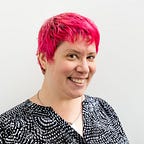Beta test: Content Design Skills Survey
From October 30–31, 2023, I opened the first version of a new Content Design Skills survey, then closed it to analyze the early data and make improvements.
I started this project because I thought it would be most useful for folks to assess their experience with using a wide variety of content design (and adjacent) skills, to see where they might want to expand their toolset.
Also, I’m interested in reporting “what impact can I make with these skills?” This isn’t like our creative hobbies — this is the skillset we get paid to use. So why do organizations pay us for these skills? What skills can a person build to get paid more for them?
People want to be measured against others
I was surprised to realize that many people took the survey to answer some version of the question, “Am I good enough?” And I just want to give you all big hugs. You were born good enough.
We all have different strengths, and every single one of these content design skills can be learned.
Some of these content design skills require opportunities at work to learn, and some can be learned in classes or workshops. All of them are possible for you, and not all of them are necessary for your organization.
We lead from wherever we are
I designed the scale to self-report expertise thinking about the progression of how surgeons learn surgery: see one, do one, teach one. That is, that we wouldn’t teach it until we’re already capable of it — which seems logical! But I made a mistake when I broke up “do” into levels like “not comfortably” and “expert.”
I had put “led others to do” and “taught others to do” above “expert” in my scale, which skewed some results.
The problem is, we’re not always experts when we’re called on to teach. Within a team or organization, we may be the most qualified person in the room. Within a growing discipline, we may be simply making stuff up, hoping that it will work! To fix this in future versions of the survey, I’ll probably separate teaching and leading into separate questions, independent of individual skills.
Of course I missed some skills
The original beta survey asked about 87 different skills. But I did miss some, and will be adding a few more to the future version! Highlights include more content operations skills like ticket-tracking (Jira, etc.), and creative skills like peer critique, collaboration, and influencing across systems.
In addition, a few survey-takers pointed out that not all skills were at the same level of specificity — some were very broad, and others very narrowly defined. This is valid and helpful feedback, and I’ll be working to refine those definitions before opening the survey again.
I do want to note: I think it’s appropriate to have variety of specificity vs. breadth in some cases. For example, some skills that are adjacent to content design are done in different ways (or to different extents) by content designers. It doesn’t make sense to describe all of those skills in greater detail, when they are already adjacent skills to content design.
Survey analysis is its own skill
I’ve worked on designing far more surveys than I’ve been in charge of analyzing. My analysis skills are rusty, and this is a LOT of data! I’m lucky that I’ve worked with so many excellent researchers, and have people I can call for help. But really, that gets me back to the original purpose of this survey: for people to find the places they can grow their skillset. My research skills are definitely getting stronger!
Next steps for this project
For some of the initial survey takers, I’m creating individual reports that answer questions like: What are my top skills? What core Content Design skills might I want to build? What business impacts am I most poised to make? I’ll be setting up interviews to review initial reports with some survey takers, so that I can improve both the survey and reports.
I’ve also heard a huge amount of interest from folks to report out the wider “state of skills,” separate from individual reports. To do this, I’ll need to open up the survey again, and get a lot more respondents! Before I do that, I need to improving the survey questions and response options so that I can make a report I feel confident about.
If you want to take the survey in the future, or want to get in touch about this project, sign up for my newsletter.
Why I’m doing this
I started this project for two main reasons: (1) to provide a way for content designers and leaders of design teams to evaluate their skills against their business and career goals, and (2) to position Catbird Content as a thought leader in meeting business goals with content design skills
My hopes are that (1) Individual content design reports are useful tools for content designers and people who are curious about doing content design, (2) Team content design reports are useful tools for design and product teams who want to foster career development and solve business problems, and (3) Catbird Content attracts business to provide training, coaching, and content design development for businesses who want to develop and/or leverage these skills.
I want to be clear: My business (and my career!) exist because we content designers have a vibrant, growing, valuable community of practice. I’m doing this not only because I have a lot of love for this discipline and the people in it, but because I want us all to keep paying our housing and health insurance bills.
If you or your organization are also providing content design skill development services, like classes, coaching, or mentoring, I’m happy to promote your offerings to survey takers. Please reach out to chat about partnering.
